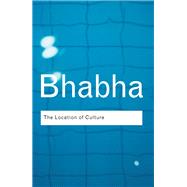
The Location of Culture
by Homi K. BhabhaBuy New
Rent Textbook
Rent Digital
Used Textbook
We're Sorry
Sold Out
How Marketplace Works:
- This item is offered by an independent seller and not shipped from our warehouse
- Item details like edition and cover design may differ from our description; see seller's comments before ordering.
- Sellers much confirm and ship within two business days; otherwise, the order will be cancelled and refunded.
- Marketplace purchases cannot be returned to eCampus.com. Contact the seller directly for inquiries; if no response within two days, contact customer service.
- Additional shipping costs apply to Marketplace purchases. Review shipping costs at checkout.
Summary
Table of Contents
| Acknowledgements | |
| Introduction: Locations of culture | |
| The commitment to theory | |
| Interrogating identity: Frantz Fanon and the postcolonial prerogative | |
| The other question: Stereotype, discrimination and the discourse of colonialism | |
| Of mimicry and man: The ambivalence of colonial discourse | |
| Sly civility | |
| Signs taken for wonders: Questions of ambivalence and authority under a tree outside Delhi, May 1817 | |
| Articulating the archaic: Cultural difference and colonial nonsense | |
| DissemiNation: Time, narrative and the margins of the modern nation | |
| The postcolonial and the postmodern: The question of agency | |
| By bread alone: Signs of violence in the mid-nineteenth century | |
| How newness enters the world: Postmodern space, postcolonial times and the trials of cultural translation | |
| Conclusion: 'Race', time and the revision of modernity | |
| Notes | |
| Index | |
| Table of Contents provided by Publisher. All Rights Reserved. |
An electronic version of this book is available through VitalSource.
This book is viewable on PC, Mac, iPhone, iPad, iPod Touch, and most smartphones.
By purchasing, you will be able to view this book online, as well as download it, for the chosen number of days.
Digital License
You are licensing a digital product for a set duration. Durations are set forth in the product description, with "Lifetime" typically meaning five (5) years of online access and permanent download to a supported device. All licenses are non-transferable.
More details can be found here.
A downloadable version of this book is available through the eCampus Reader or compatible Adobe readers.
Applications are available on iOS, Android, PC, Mac, and Windows Mobile platforms.
Please view the compatibility matrix prior to purchase.
